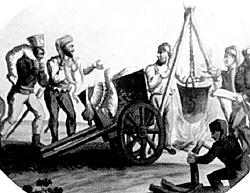Militia Summer Camp
1779
by Edgar Lawrance
| |
It also places a large number of Militia and Regular regiments during the summer of 1779, something that will be of interest to a number of readers. The issue of artillery is also interesting.
As we all know the Militia spent a great deal of time on the march, and also had to attend a summer camp for training each year. The 1st Devonshire Militia were no exception. In May 1779, whilst at Wells, they were ordered to march to Cox Heath via Newbery in two divisions. The route was. Frome, Devises, Malborough, Hungerford and Newbery Speen where they stayed until the 1 Oth June. Then via Reading, Warfield, Thorpe Lions Green, Ditton, Beddington, Cranford, Brampton, Maidstone and Cox Heath Camp, arriving on the 21st June.
This was a very large camp, besides Cavalry and Artillery there were the 6th, 14th, 50th, 65, and 69th Regiments, and the 1st Devon, East Suffolk, Monmouth, Northampton, Bucks, East Norfolk, Somerset, Dorset, Worcester, East and North York, North Gloucester, North Lincoln, Rutland, Anglesea and Caernarvon Militia, the whole under the command of Lt. Gen. Peirson.
The 1st Devon was brigaded with the Suffolk and Monmouth, and in common with the other regiments had two field guns attached to it, which were manned by men of the regiment, a Sergeant of Artillery and two "Mattrosses" or gunners being attached to assist.
Strict orders as to the rations of everything from bread to wood were issued, there being more regulations to wood than any thing else. For example, each soldier was to receive three pounds of wood per diem, issued according to the number of men per tent. For some reason the quarter and rear guards of foot and the standard and rear guards of cavalry required no wood until the end of summer. And so it went until one got to the ration for Lt Gens and their ADC, which was fifty rations per diem, Maj. Gens. got thirty rations.
Hygiene was a problem, at one time a fever broke out, general orders were then given to move the tents more often and the ground on which the tents had stood to be turned and earth thrown on it. This would not have stopped the fever, but it might have had some moral value as something was being done.
Breaches of the Peace
With a camp as large as this, there were inevitably serious breaches of the peace. As examples two reports from the Exeter Flying Post in the August.
Late night 19th. Captain Emmerson was stopt by the Provost Guard about half a mile from Maidstone. Corporal Jeering stopped him, and desired to know where he was going, if he had permission and other such necessary questions as his duty required. Captain Emmerson is an officer in the Bucks; he only told the Corporal, 'I'm an officer, let me pass or I'll shoot you' The Corporal endeavouring to seize him, on his refusing to comply with his request, made the sign for assistance, and Captain Emmerson said, 'Damn you' then fired a pistol at him and wounded him in the right breast. The Guard immediately coming up, and Captain Emmerson endeavouring to escape, he was unfortunately shot dead by the guard: three men fired, by whom he was killed cannot be ascertained. The Corporal is in a very dangerous way, and is in the new General Hospital.
24th August. Lieut. Williams of the Monmouth was tried and acquitted of inciting his men. He challenged his accuser, Lt Colonel Owens of the same Regiment, and they fought behind the lines of the Northampton. They fired twice, and on the third shot Lieut. Williams shot Lieut. Colonel in the left breast, and he died seven minutes afterwards. Lieut. Williams, who was a relative, is said to be nearly dead with grief.
On the 7th November special care is enjoined on the Commanding Officer to see that their transport horses are quickly available, "as the enemy's fleet being understood to be at Sea it may occasion a very sudden movement to this Army"
Orders were given on the 19th of November to break up the camp at Cox Heath, the 1st Devon being ordered to Kingston-upon-Thames. They left on the 29th, taking their guns with them, and arrived at Kingston on the 2nd December.
|
 Whilst the following is strictly speaking not Napoleonic, I feel it gives an idea of what annual camp was like. And the enemy was of course the French who had just agreed to join with the Americans in their fight against us in the American War of Independence. Was such a camp much different twenty years later?
Whilst the following is strictly speaking not Napoleonic, I feel it gives an idea of what annual camp was like. And the enemy was of course the French who had just agreed to join with the Americans in their fight against us in the American War of Independence. Was such a camp much different twenty years later?